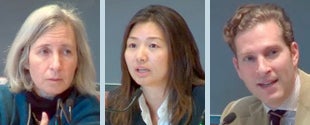Students must recognize and embrace the differences between legal training and their previous academic experiences, said Dean Martha Minow and Professors of Law Jeannie Suk and Noah Feldman in a Harvard Law School panel discussion last week.
Titled “Life of the Law, Life of the Mind” and attended mostly by first-year J.D. students, the talk focused on the perceived and actual dichotomies between legal education and other academic disciplines, and how students may come to accept this division.
Minow explained that legal training historically has not been part of the academy but operated as an apprenticeship system. It was not until the last few decades that other disciplines like economics and sociology “started to feel germane to the study of law” in improving internal approaches to law, as well as explaining legal workings from an external perspective.
“For students who come to (this) school with another discipline as a framework… take the tools that you’ve learned from another discipline and use that, because it’s a terrific way to get a perspective on what’s going on,” said Minow. “At the same time, use law school as an internal enterprise… to understand what are the unstated assumptions inside of the community known as lawyers and to welcome what will become a bilingualism.”
Suk described the discomfort students may feel when they first arrive at law school, which she compared to “boot camp,” given the “trade school elements” of their legal education “that fit uneasily sometimes with the intellectual academic inquiry.”
There is shock, said Suk, that comes with realizing the disconnect between what one has come to value through previous education or career paths and what is relevant in law school. Nevertheless, students must learn to be comfortable in their new skin.
“It’s not about abandoning something, it’s about saying I can speak multiple languages, I can be different people,” said Suk. “The life of the mind, the life of the law, they have overlaps. They’re not exactly the same thing, but they’re not so far apart that you have to choose one over the other.”
Feldman discussed the differences between legal education and other academic disciplines, namely the approach to legal reasoning unfamiliar to those outside of the profession. Faculty members use the Socratic method to tell students their natural exercises of reason and intuitions are wrong, said Feldman, because there are established forms of legal thought that are not accessible to general reasoning.
“There is an ongoing tension, in my view, a fruitful tension, between the internal logic of legal reasoning, artificial reason, and the intellectual and disciplinary approaches that come from other fields,” said Feldman. “The fact that there is no resolution… that’s a good thing. That’s a basis for creativity; it’s a basis indeed for the life of the mind.”
He added that students at HLS will quickly realize that unlike in some other academic fields, there are legal arguments that are clearly good or bad, despite there being no “serious, epistemological, or formal account” of what makes them good or bad.
“There’s something violent about one’s encounter of artificial reason which insists on claims of truth and falsehood and yet cannot articulate the principles whereby its claims of truth and falsehoods can be measured except to say, ‘Well, stick it out, it’s only October.’”
— Joanne Wong
